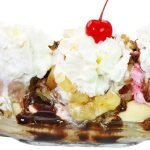If you send your tea back to the kitchen because it isn’t hot enough for you, here’s a reason to reform your gourmet ways. According to a study just published in the British Medical Journal, drinking hot tea increases your risk for esophageal cancer — by a lot. Drinking very hot tea, 158 degrees Fahrenheit or above (that’s finger-burning hot), raises your risk by 800 percent. Regular hot tea, 156-157 degrees, doubles the risk when compared to tea that’s merely very warm. That’s a huge reduction in risk for sacrificing just two degrees of scalding. And the risk disappears at 149 degrees or below.
Hate the idea of drinking lukewarm Earl Gray? Take a food thermometer and dip it in your tea-water. You’ll discover that 149 degrees still makes a nice hot cuppa, complete with steam. And also, if you put milk in your tea, you’ll probably cool it automatically to an acceptable level. The experts suggest letting it cool for five minutes after pouring your boiling water. Anyway, according to Mrs. Beeton’s Book of Household Management, the civilized thing to do is to wait five to ten minutes before pouring tea. “By this time the tea will be sufficiently flavorsome and unlikely to cause thermal injury,” says David Whiteman of the Queensland Institute of Medical Research.
It turns out that the temperature when you start drinking isn’t the only factor that contributes to cancer — speed of drinking does, too. Consuming tea within two minutes of pouring it increases the risk of esophageal cancer by 500 percent. If you slow down to a four-minute pace, you run little risk.
The researchers in this case came from the University of Tehran, where they studied the tea drinking habits of 300 people diagnosed with esophageal squamous cell carcinoma and compared them to 500 people without the disease. In Northern Iran, where the participant group was drawn from, rates for this type of cancer are among the highest in the world. And yet, the population does not have high rates of alcohol consumption or tobacco smoking, the two risk factors most commonly associated with esophageal cancer. It’s tea drinking that’s rampant in that part of the world; the participants drank, on average, more than a quart of black tea daily.
The researchers concluded that it isn’t the tea per se causing problems; rather, it’s the fact that the tea is hot. Scientists suspect that the hot beverage causes damage to the lining of the esophagus. “The problem is not the tea but the chronic inflammation from drinking it hot,” according to Dr. Michael Thun of the American Cancer Society.
In any event, esophageal cancer isn’t one of the more benign cancers. The disease kills at least half a million people annually worldwide, and the five-year survival rate is only about 23 percent, at tops, with some sources saying it’s more like 12 percent.
By the way, though the study focused on hot tea, it makes sense that the same issues apply to other hot beverages as well. And so even when the icicles dangle off your roof, it’s better to cool down your coffee or hot chocolate before guzzling it down. The same warning applies to food that’s straight out of the oven, scorching hot.
Some nutritionists advocate avoiding any extreme temperatures in beverages, which means avoiding cold as well as hot drinks. They say that cold water numbs the organs and interferes with proper digestion. There’s also some evidence that cold beverages can cause heart attacks, particularly after vigorous exercise, and that cold water can trigger miscarriages. And a study at the University Hospital of Uppsula in Sweden found that cold water can bring on migraines. On the other hand, some say that cold water cools you down quickly after exercise and brings body temperature back to normal.
In short, you’re safest bet is taking the middle path when it comes to drinking and beverages. Don’t gulp down liquids at either temperature extreme (sip them if you must), and drink before or after meals, not with meals. And if it’s hot tea you crave — if you agree with Mrs. Beeton that, “The beverage called tea has now become almost a necessary of life” — you might want to follow her suggestions for making temperature-acceptable tea.
:hc












Wow, I never thought that the temperature of a beverage would have the ability to cause cancer, especially something like tea with it’s antioxidant qualities. Also, I looked into that cold tap water study, at least the link that was posted, and it seems as if the coldness of the water is not what causes miscarriages but the fact that its tap water in general…as the article suggests that women in their first trimester should boil the tap water before they drink it, leading me to believe that the cause of the miscarriages is due to the makeup of the water.
I like green tea and I know there is a range of temperatures with different types of teas, these different temperatures give you different flavors. But I am confused that coffee drinkers were not studied or even hot chocolate drinkers?
Mark:
No need to be confused. The study was conducted in Northern Iran, where the participant group was drawn from because rates for this type of cancer are among the highest in the world. Super hot tea is the drink of choice in that part of the world. Caffe lattes at Starbucks are really not an option there. And keep in mind, the researchers concluded the resutls of the study had nothing to do with the fact people were drinking tea — it was that they were drinking very hot liquids.